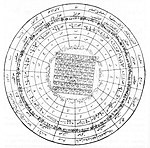Draft:Al-Mulk (Qayyūm al-Asmā)
 | Draft article not currently submitted for review.
This is a draft Articles for creation (AfC) submission. It is not currently pending review. While there are no deadlines, abandoned drafts may be deleted after six months. To edit the draft click on the "Edit" tab at the top of the window. To be accepted, a draft should:
It is strongly discouraged to write about yourself, your business or employer. If you do so, you must declare it. Where to get help
How to improve a draft
You can also browse Wikipedia:Featured articles and Wikipedia:Good articles to find examples of Wikipedia's best writing on topics similar to your proposed article. Improving your odds of a speedy review To improve your odds of a faster review, tag your draft with relevant WikiProject tags using the button below. This will let reviewers know a new draft has been submitted in their area of interest. For instance, if you wrote about a female astronomer, you would want to add the Biography, Astronomy, and Women scientists tags. Editor resources
Last edited by Monkbot (talk | contribs) 22 days ago. (Update) |
| المُلْك Al-Mulk The Dominion | |
|---|---|
| Other names | The Kingdom |
| No. of verses | 42 |
| No. of words | 776 |
Al-Mulk (Arabic: الملك, lit. 'the Dominion', 'the Kingdom') is the first chapter of the Qayyūm al-Asmā[1] comprising 42 verses just as the rest of the chapters of the book. In the Qayyūm al-Asmā, Surah Al-Mulk is the only chapter that does not begin with a verse from Surah Yusuf.[2] The chapter also shares its name with sixty-seventh chapter of the Quran, Al-Mulk.[3]
History
[edit]According to some Bahā'ī sources, Al-Mulk was revealed to Bab during his encounter with the young Shaykhī Mullā Ḥusayn Bushrū'ī in his house in Shiraz. This occurred on the evening of the 5th Jumada Al-Awwal 1260 in the Islamic calendar, or May 22nd 1844 in the Gregorian calendar. This chapter was titled Al-Mulk by the Báb himself as the word occurs several times within the chapter.[4]
Summary
[edit]- Verses 1-5: Affirms the divine origin and truth of the revealed Book, emphasizing its role as a guiding light and straight path for humanity.
- Verses 6-13: Establishes the authenticity of the Book, presents the lineage of the Hidden Imam, and bears witness to the oneness of Allah while warning against disbelief and its consequences
- Verses 14-22: Emphasizes the oneness of Allah, His attributes of knowledge and authority, and urges believers to submit to His will and seek closeness to Him through worship and obedience.
- Verses 22-29: Addresses kings, urging them to relinquish worldly dominion in favor of divine truth, warning them of the consequences of opposing the Reminder, and emphasizing the inevitability of Allah's judgment.
- Verses 30-33: Assures believers of reward for obedience to the Reminder, reiterates the promise of high status in Paradise, and asserts Allah's authority over all things.
- Verses 34-39: Directs believers to convey divine signs to other regions, affirms Allah's sovereignty, and encourages obedience to His decrees while warning against disbelief.
- Verses 40-42: Promises reward for obedience to the Reminder and asserts Allah's power and knowledge over all creation.[5]
| Part of a series on |
| Bábí texts and scriptures |
|---|
 |
| The Báb's works |
| Compilations |
References
[edit]- ^ "Haykal - Writings of the Bāb | Hurqalya Publications: Center for Shaykhī and Bābī-Bahā'ī Studies". hurqalya.ucmerced.edu. Retrieved 2024-04-13.
- ^ "Surah Yusuf". quran.com. Retrieved 2024-04-14.
- ^ "Surah al-Mulk". quran.com. Retrieved 2024-04-14.
- ^ "The Sūrat al-mulk of the Qayyum al-asma', Introduction. | Hurqalya Publications: Center for Shaykhī and Bābī-Bahā'ī Studies". hurqalya.ucmerced.edu. Retrieved 2024-04-14.
- ^ "The Sūrat al-mulk of the Qayyum al-asma', Introduction. | Hurqalya Publications: Center for Shaykhī and Bābī-Bahā'ī Studies". hurqalya.ucmerced.edu. Retrieved 2024-04-14.
